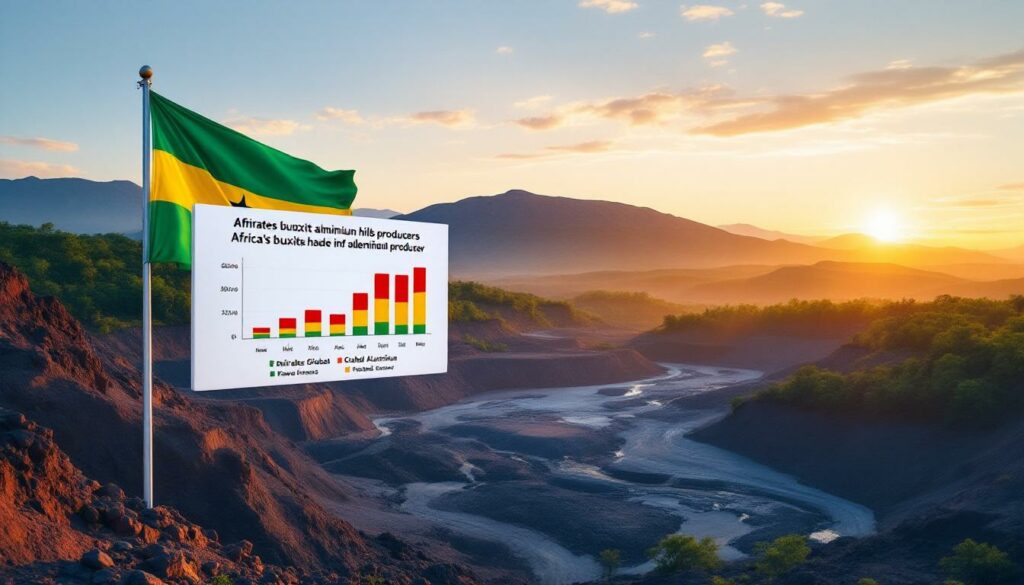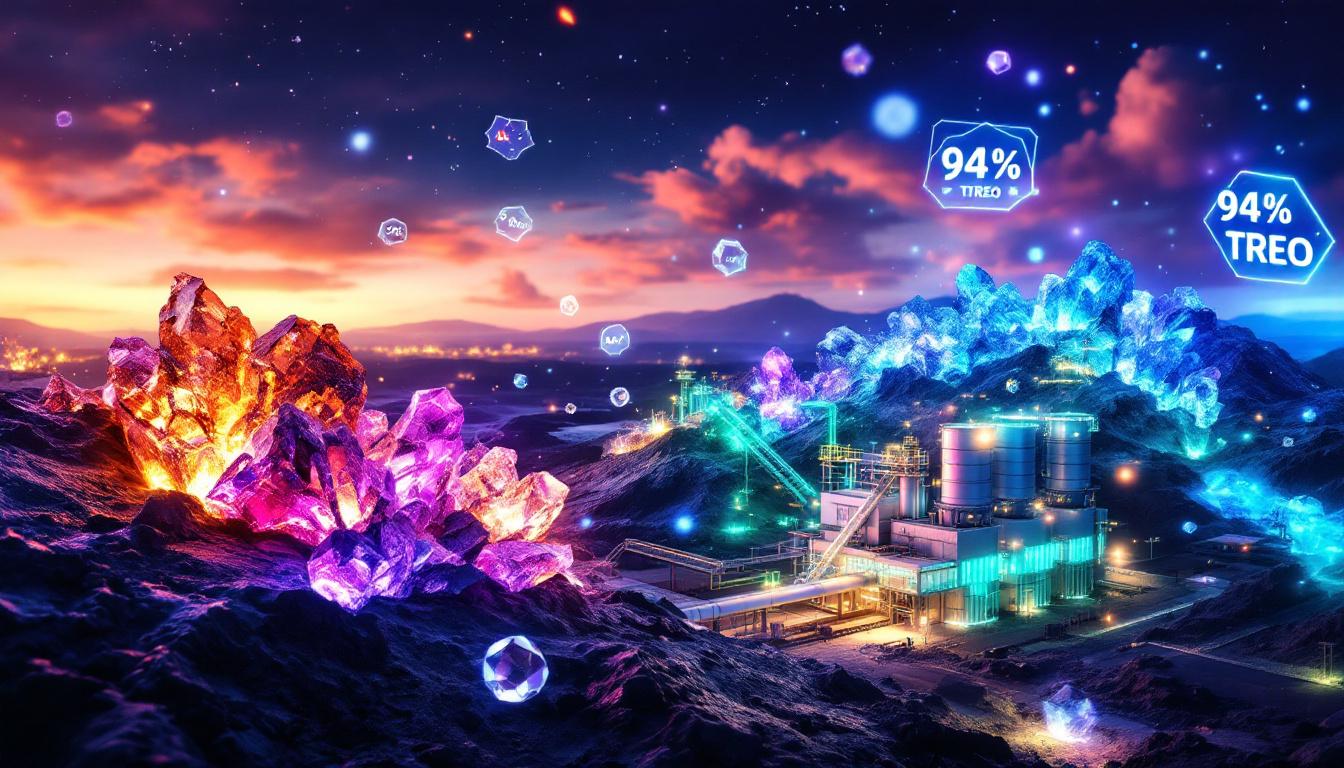Ghana Cancels $1.2 Billion Bauxite Deal: Strategic Pivot Towards Global Partnerships
What Led to Ghana's Cancellation of the Rocksure Bauxite Deal?
The Terminated Agreement: Key Details
In a significant shift for Ghana's mining sector, the government has officially terminated its $1.2 billion bauxite lease agreement with Rocksure International. This cancellation affects the development of the Nyinahin Hills deposit, which contains an estimated 376 million tons of bauxite reserves – a substantial portion of Ghana's mineral wealth.
The original joint venture structure allocated ownership as 70% to Rocksure International, 20% to the Ghana Integrated Aluminium Development Corporation (GIADEC), and 10% to the Government of Ghana. This structure was designed to balance private sector efficiency with government oversight and revenue sharing.
The legal basis for the cancellation stems from a 2019 Supreme Court ruling regarding the Exton Cubic case, which established that mining leases require parliamentary ratification to be valid under Ghanaian law. Without this ratification, the Rocksure agreement was deemed legally insufficient.
"By the Exton Cubic ruling, without ratification, you have no lease," noted a source familiar with the decision. This legal precedent has now reshaped Ghana's approach to mining industry evolution.
Ghana's Bauxite Potential and Current Position
Ghana possesses approximately 900 million metric tons of bauxite reserves, ranking it seventh globally in terms of bauxite resources. This substantial endowment represents significant economic potential if properly developed and managed.
Current production metrics show Ghana produced 1.7 million tons in 2023, with projections indicating an increase to 2 million tons by 2025, according to data from the Ghana Chamber of Mines. This growth trajectory, while positive, still places Ghana far behind regional competitor Guinea, which produces approximately 85 million tons annually from its massive 7.4 billion ton reserve.
Ghana's challenge has consistently been attracting sustained investment in both mining infrastructure and refining capacity. While the country has substantial reserves, it has historically struggled to develop the integrated aluminum value chain necessary to maximize bauxite project benefits from these resources.
The quality of Ghana's bauxite deposits, particularly in the Nyinahin Hills region, is considered commercially viable with adequate alumina content for profitable extraction. However, the lack of local processing facilities has limited the value addition potential of the sector.
Why Is Ghana Seeking New International Partners?
Strategic Shift in Resource Development Approach
Ghana's pivot from local development to international partnerships represents a strategic recalibration of its resource development approach. The government, through GIADEC, has recognized that partnering with established global aluminum companies brings critical advantages in technical expertise, capital investment, and market access.
GIADEC has established an ambitious timeline to begin extraction at Block B by Q1 2026, requiring swift action in securing new partnerships. This aggressive schedule reflects the government's determination to accelerate development of its bauxite resources after previous delays.
The strategic shift also aligns with Ghana's broader critical minerals strategy, which aims to reduce economic dependence on gold production. Developing an integrated aluminum industry would provide a more balanced mineral portfolio and increase economic resilience.
Potential International Partners Under Consideration
Emirates Global Aluminium (EGA) has emerged as a frontrunner among potential partners. The Dubai-based company signed a Memorandum of Understanding with GIADEC in June 2025, expressing interest in "jointly developing bauxite opportunities in Ghana," according to an EGA statement.
Notably, EGA previously considered involvement in Ghana's bauxite sector in 2022 but ultimately chose not to proceed, partly due to concerns about jeopardizing its existing licenses in Guinea. This history highlights the complex regional dynamics at play in West African mining partnerships.
Several Chinese companies have also expressed interest in Ghana's bauxite resources, building on China's extensive involvement in African mining projects. Chinese firms bring significant experience in developing integrated mining and processing operations across the continent.
| Partner | Background & Interest |
|---|---|
| EGA | Dubai-based; MoU with GIADEC (June 2025); former Guinea licensee |
| Chinese Firms | Multiple companies in talks; prior investments in mining/refining in Africa |
The selection of partners will likely be influenced by their willingness to invest in downstream processing rather than just raw material extraction, aligning with Ghana's value addition objectives.
How Will This Affect Ghana's Aluminum Industry Development?
Economic and Industrial Implications
The shift to international partnerships carries significant implications for Ghana's integrated aluminum industry development plans. With the right partner, Ghana could accelerate development of a complete value chain from mining to refining and potentially even smelting.
Infrastructure requirements represent a major challenge, including not only mining facilities but also transportation networks and refining capacity. The development of rail links from mining sites to ports will be particularly crucial for efficient export capabilities.
While specific employment projections remain unclear, the development of an integrated aluminum industry would create jobs across multiple skill levels, from mining operations to technical roles in processing facilities. The multiplier effect could generate significant economic benefits for communities near mining and processing sites.
The greatest economic potential lies in mineral beneficiation opportunities through local processing rather than raw bauxite export. Refined alumina commands significantly higher prices than raw bauxite, potentially multiplying the economic benefits to Ghana if processing capabilities are developed.
Disclaimer: Economic projections regarding employment creation and revenue generation depend heavily on the specific terms of future partnership agreements and global market conditions for aluminum.
Environmental and Social Considerations
Environmental challenges represent a significant concern, particularly as many of Ghana's bauxite deposits are located within forest reserves. Mining operations will require careful management to minimize deforestation, water pollution, and habitat disruption.
Community impact assessments will be essential components of any new partnership agreements. Effective benefit-sharing mechanisms must ensure that local communities receive tangible advantages from mining activities, including infrastructure development, employment opportunities, and social services.
Sustainability considerations will likely feature prominently in new partnership agreements, with international partners increasingly sensitive to environmental, social, and governance (ESG) requirements. Modern mining practices can significantly reduce environmental impacts compared to older methods.
The challenge of balancing economic development with environmental protection requires thoughtful policy frameworks and strict regulatory enforcement. Ghana's environmental protection agencies will play a crucial role in monitoring compliance with environmental standards.
What Does This Mean for Global Bauxite Markets?
Market Impact and Industry Trends
Ghana's planned increase in bauxite production to 2 million tons by 2025, while significant for the country, represents a relatively modest addition to global supply. For context, global bauxite production exceeds 370 million tons annually, with Australia, Guinea, and China dominating production.
The global aluminum industry continues to show strong demand growth, driven by construction, transportation, and renewable energy sectors. This favorable demand environment provides a positive backdrop for new entrants like Ghana.
Ghana's strategic positioning in the bauxite-aluminum market will depend heavily on its ability to move up the value chain. Countries that can process bauxite into alumina and eventually aluminum enjoy significantly higher economic returns than those that merely export raw materials.
| Country | Annual Production (2023) | Reserves | Processing Capacity |
|---|---|---|---|
| Guinea | 85 million tons | 7.4 billion tons | Limited |
| Ghana | 1.7 million tons | 900 million tons | Minimal |
| Australia | 110 million tons | 5.1 billion tons | Extensive |
| China | 86 million tons | 1 billion tons | High |
| Brazil | 32 million tons | 2.6 billion tons | Moderate |
Investment Opportunities and Risks
The investment opportunities 2025 in Ghana's bauxite sector are substantial, particularly for companies seeking vertical integration opportunities in the aluminum supply chain. The combination of significant reserves and government support creates an attractive proposition.
Political risk factors include potential changes in mining regulations, taxation policies, and government priorities. The requirement for parliamentary ratification of mining leases adds a layer of political complexity that investors must navigate.
Operational risks include infrastructure limitations, particularly transportation networks from mining sites to ports. Companies considering investment must factor in significant capital expenditure for infrastructure development.
The long-term outlook for return on investment in Ghana's bauxite industry will depend heavily on global aluminum prices, which have historically shown volatility. However, the structural demand growth for aluminum in emerging economies provides a generally positive outlook.
Investment Disclaimer: Past performance is not indicative of future results. Investment in mining projects carries significant risks including political, operational, and market factors that can substantially impact returns.
FAQ: Ghana's Bauxite Industry Development
What factors contributed to the cancellation of the Rocksure International deal?
The primary factor was the lack of parliamentary ratification for the mining lease, as required by Ghanaian law following the 2019 Supreme Court ruling in the Exton Cubic case. This legal requirement serves as a check on executive authority in granting mining concessions.
How does Ghana's bauxite quality compare to other global deposits?
Ghana's bauxite typically contains 40-45% aluminum oxide (alumina), which is commercially viable though not among the highest grades globally. Australian deposits often exceed 50% alumina content, while Guinean bauxite typically contains 45-50% alumina. However, Ghana's deposits have relatively low silica content, which is advantageous for processing.
What infrastructure is needed to fully develop Ghana's bauxite resources?
Complete development requires mining facilities, transportation infrastructure (rail lines and roads), port facilities for export, and ideally refining capacity to process bauxite into alumina. The estimated investment for comprehensive infrastructure development exceeds $3 billion.
How might this strategic pivot affect local communities near the Nyinahin Hills?
Communities will likely experience both positive impacts (employment opportunities, infrastructure development, community development funds) and challenges (potential environmental disruption, land use changes). Effective community engagement and benefit-sharing will be crucial for sustainable development.
What are the potential economic benefits of a successful international partnership?
Benefits include foreign direct investment, technology transfer, skills development, employment creation, tax revenue, and potential downstream industrial development. A fully integrated aluminum industry could generate billions in economic value and thousands of jobs.
How does Ghana's approach differ from other bauxite-rich African nations?
Ghana's emphasis on developing an integrated aluminum industry distinguishes it from countries like Guinea, which primarily export raw bauxite. Ghana's approach seeks to capture more value domestically through processing, though this requires significantly more investment and technical capacity.
What's Next for Ghana's Bauxite Sector?
Short-term Development Timeline
The immediate next steps involve finalizing partner selection, with GIADEC sources indicating that talks with EGA and several Chinese firms are at an advanced stage. The government appears to be prioritizing partners with both technical expertise and willingness to invest in processing capacity.
Regulatory approvals will represent a critical milestone, with any new agreement requiring parliamentary ratification to avoid the legal issues that affected the Rocksure deal. This process typically takes several months in Ghana's legislative system.
Preliminary development activities at Block B may begin even as partnership negotiations continue, potentially including detailed geological surveys, environmental impact assessments, and community consultations. These activities would position the project for rapid advancement once partnerships are finalized.
The projected timeline for initial production under new partnership structure remains targeted for Q1 2026, though this will depend on the speed of partner selection and regulatory approvals. Infrastructure development represents the most time-consuming aspect of the project.
Long-term Vision and Strategic Goals
Ghana's integrated aluminum industry development roadmap envisions a complete value chain from bauxite mining through alumina refining to aluminum smelting. This vertical integration would maximize economic benefits and create a diverse industrial ecosystem.
The potential for downstream processing and value addition represents the most significant economic opportunity. Aluminum products command substantially higher prices than raw materials, creating the potential for a manufacturing sector based on domestically produced aluminum.
Export market development will focus on both regional African markets and international buyers, with growing demand in construction, automotive, and renewable energy sectors. Ghana's geographic position provides logistical advantages for serving European and American markets.
The contribution to Ghana's broader economic diversification goals is substantial, reducing dependence on gold exports and creating a more resilient economy. The aluminum industry could become a cornerstone of Ghana's industrial development strategy.
Comparison of Major Bauxite Producers in Africa
| Country | Annual Production (2025) | Estimated Reserves | Key International Partners | Processing Capacity |
|---|---|---|---|---|
| Guinea | 85 million tons | 7.4 billion tons | China, Russia, UAE | Limited |
| Ghana | 1.7-2 million tons | 900 million tons | Seeking (EGA, Chinese firms) | Minimal |
| Sierra Leone | 1.2 million tons | 180 million tons | Chinese companies | None |
| Tanzania | 0.3 million tons | 120 million tons | Various | None |
Industry Insight: Ghana's strategic pivot represents a significant opportunity to transform its position in the global aluminum value chain. By attracting established international partners with technical expertise and market access, Ghana could potentially accelerate development of its bauxite resources while ensuring greater economic benefits through integrated processing capabilities.
Further Exploration
Readers interested in tracking developments in Ghana's bauxite sector can follow updates from the Ghana Integrated Aluminium Development Corporation (GIADEC) and industry publications like Mining.com, which regularly cover developments in global bauxite markets and African mining projects.
The evolution of Ghana's $1.2 billion bauxite deal cancellation and subsequent partnership formation will provide valuable insights into the changing dynamics of resource development in Africa, as countries increasingly seek to capture more value from their natural resources through strategic international partnerships.
Want to Capitalise on the Next Major Mineral Discovery?
Stay ahead of the market with Discovery Alert's proprietary Discovery IQ model, which delivers real-time notifications of significant ASX mineral discoveries like those in Ghana's bauxite sector. Explore how historic discoveries have generated substantial returns by visiting Discovery Alert's dedicated discoveries page and begin your 30-day free trial today.




